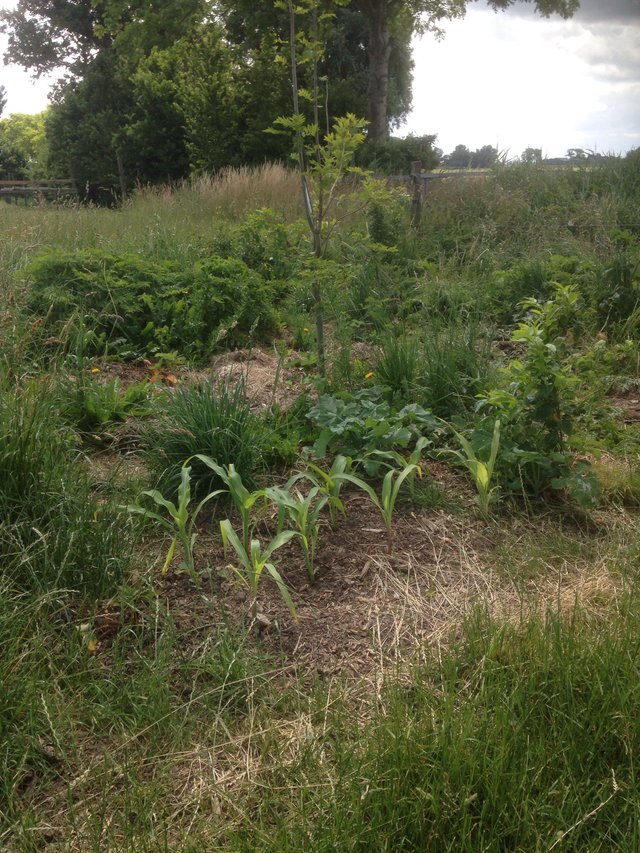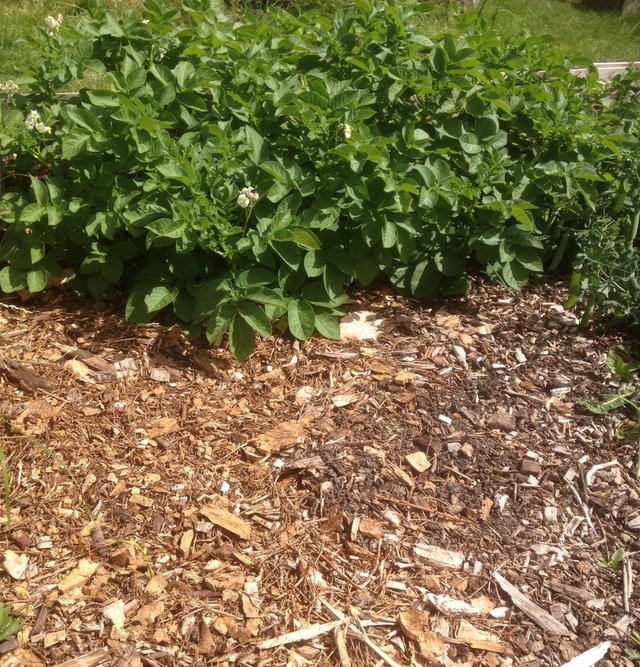A talk about woodchip gardening
Today I would give you an honest talk about woodchip gardening.
Now before we begin let me set some things straight. I am not talking about the Back to Eden method. There is much misconception about this as a “vegan” way of gardening. Unlike most people think, Mr. Gautschi DOES use animal manure. (he mentioned this clearly in last years garden tour on youtube by thatnub).
In today’s talk we will not be talking about layered garden beds of any sort, I have tried soil/compost/animal manure/paper/cardboard layered beds before, writing everything out would make a book. So to avoid taking up all your time we’ll just talk about a woodchip cover.
To be even more specific: Woodchips on clay.
I have got one spot with woodchips on sand but I’m not that experienced since I’m used to clay.
Gardening with woodchips can be both challenging and rewarding. Putting woodchips on bare dried out clay can rejuvenate that spot very quickly. It’s basically serving a buffet for soil life. I have used both small and large chips. My neighbour makes firewood so any excess shavings and woodchips end up with me. Most of these chips are quite big, some might even call it chunks of wood. Nature doesn’t care much. She just says you need more patience. Once your soil life is on the roll it doesn’t matter if something breaks down a little slower.
Most plants need sunlight, water and a space to grow. I don’t say minerals or soil cause plants can grow in tapwater, on rocks and even styrofoam. Plants create a marketplace on and around their roots, giving something and asking whatever they need in return. Microorganisms work their butt off to make that plant happy. For example each teaspoon of soil contains more minerals than that plant could ever need. It just needs the organisms to make it available to them. As a gardener our main job is to promote that network of soil life. That is why I have NEVER bought a bag of minerals or fertilizer in my life. I do use manure from my animals to make a rough compost but still rely on the soil life to make it available to the plants/roots.
Woodchips have the amazing ability to maintain moisture on dry spots and absorb excess water on very wet spots. I had one area that I couldn’t grow anything in because as soon as the rain hits it would turn into a swamp. I put several feet of woodchips on there in the fall and am growing in it this year. It doesn’t have the right balance in soil life yet (so I deal with pests by hand). You can tell by digging, there are earthworms hard at work but not a whole bunch of them. Slowly a brownish layer of decomposed matter is forming but it’ll need one or two more years before the little critters start to balance themselfs out.
On another area it was so dry that I had cracked clay soil almost all the time. It was totally dry and compacted and had no way to hold any moisture when it rained. Adding just a thin layer of woodchips was enough to hold moisture and rejuvenate the seedbank in the soil. Most microscopic critters go into a dormant state when their environment goes bad. Just add water and they’ll pop up in no-time.
The weeds often tell me that soil is ready to be planted.

a little woodchip area with some old hay on the side
Having woodchips on the soil can also bring along some challenges.
While we stimulate soil life it can also be a heaven for slugs and ants (we don’t have any fire ants locally but there have been reports by other homesteaders.)
With our wet conditions growing in-ground in woodchips is a nightmare in spring. Everything gets eaten with more slugs than a leaf can hold. Also because there are tons of critters you can bet that things like root vegetables and sweet things that touch the ground (like strawberries) might get devoured by beetles, ants and whatever likes these things in your area.
Most people give up at this stage, most of the time somewhere in the first three years when the ecosystem still needs to find it’s balance.
Understandably it can be a pain in the backside.
What I use woodchips for are things like fruit trees, berry bushes but also more permanent garden beds like asparagus. It also has it’s uses for things that are harmed or infected by wet conditions such as potatoes, herbs usually like good drainage so they thrive too, cucumbers can get all the moisture they want and tomatoes like it too.
In general I don’t like to use these spaces for leafy or root vegetables. Also peas and beans suffer in the first one maybe two years, they will turn yellow unless you add some type of manure. (They prefer a more established marketplace).
Things to also consider is that weeds will germinate no matter how much chips you put on. Seeds will be blown on top of your woodchips and if you get a lot of rain you’ll surely see young weeds and hoeing in (large) woodchips is not possible. Same issue on garden paths. Your soil will not be so soft that it is easy to pull these suckers out, if your soil is hard that will only happen after at least a couple years.
What I would recommend for new woodchip gardens is to put something like potatoes or asparagus (low maintenance stuff) in there for the first couple of years. Once you’ll put your shovel in the ground and see tons of beetles, worms and other creepy crawlers it will be ready for other plants. It has to look like a miniature metropolis or you might be in for a hard time trying to keep your leafy greens alive.

A first year potato patch, already ate some. Used chickens to remove the grass, then added woodchips in winter.
I still use different garden methods including woodchips and prefer it for the low maintenance plants for example my asparagus. I don’t weed these patches and simply weed whack it in fall put another layer on it. Over the years your soil will become this loose fluffy material with all nutrients readily available. I think it’s worth to set aside a couple of these patches, besides, it smells like a forest after it rains.
I once watched a video by a chap who swore by just piling on woodchip. He liked to use fresh chipped with the leaves included, if possible. He lived in a fairly dry area and found he didn't need to water much at all using this method and every year the soil just got better. I'm taking this approach on my front with the perennials.
Posted using Partiko Android
You've been visited by @nateonsteemit from Homesteaders Co-op.
Glad to see that @minismallholding has been here. She shared your awesome post with us in our discord server. Thanks so much for all this information, your success with wood chips looks awesome!
A community marketplace of ethical, handmade and sustainable products available for STEEM, SBD (and USD): https://homesteaderscoop.com
follow: @homesteaderscoop
Thank you both! Love to contribute to the homesteading community.
This article has been selected and voted by @omnesplantae Content Curator, visit the discord server for a 360 ° travel experience! https://discord.gg/zd7vFSz
Hi warfsterveld,
Visit curiesteem.com or join the Curie Discord community to learn more.
Congratulations @warfsterveld! You have completed the following achievement on the Steem blockchain and have been rewarded with new badge(s) :
You can view your badges on your Steem Board and compare to others on the Steem Ranking
If you no longer want to receive notifications, reply to this comment with the word
STOPVote for @Steemitboard as a witness to get one more award and increased upvotes!
It looks like this method can fix many problems. In my hometown we face some issues with rain as well. When there is too much rain, the soil is not able to absorb it all and it will turn into swamp. This sounds like a possible solution for us too! I like to see potatoes thriving there as well as we plant them a lot back home :)
Thank you for sharing and have a lovely day!
Woodchip gardening is something I am hearing for the first time and I search on google before proceeding with reading this post. Some new for my brain here but it sounds good and I like the proof that Potato patch ate some of it :P hehe Nice, thank you for sharing this unique thing and congrats on your curie vote :):):)